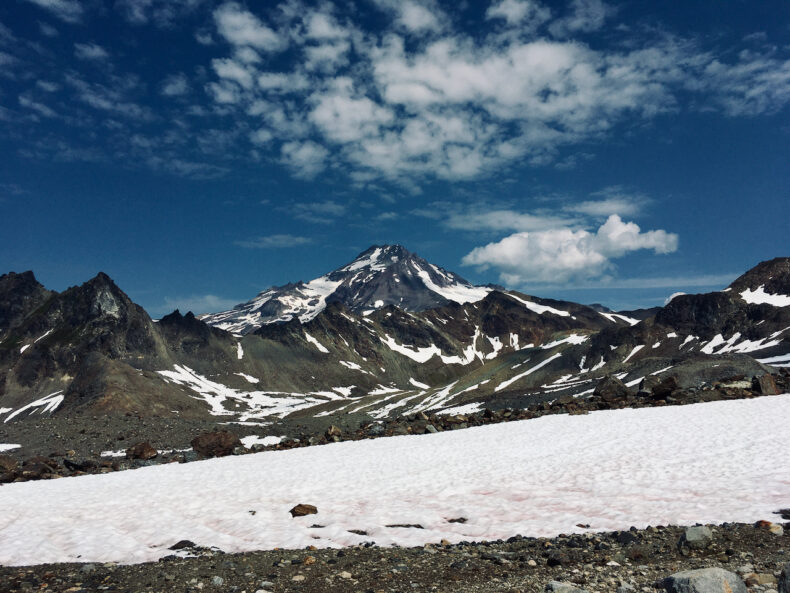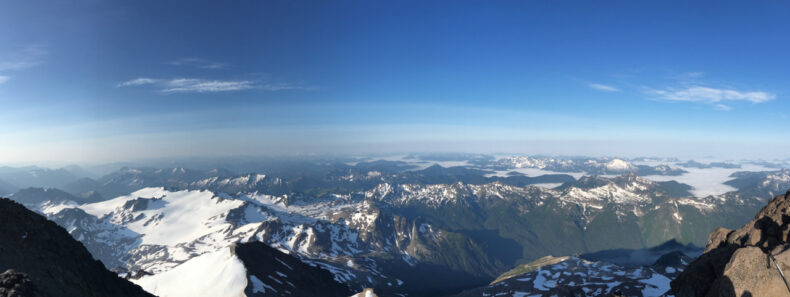
This past weekend, I climbed Glacier Peak with a friend of mine. Glacier Peak is Washington’s fourth-highest mountain, and also one of the state’s five stratovolcanoes. (Perhaps you’ve heard of one of the others; I know I have.) What distinguishes Glacier Peak among its volcanic kin is its remoteness. It is at the eastern edge of Snohomish County, and you can’t see it from any of the major highways and byways unless you really know where to look. Also, the approach to the start of the standard climbing route is at least twelve miles long, depending on where you set up your high camp. Some of this hike is through lovely cool evergreen forest, and some of it is through lovely open alpine meadows, but a lot of it is just up up up a series of unrelenting switchbacks. Then, of course, there is the climb itself: five miles and four thousand feet of glacier and mountain until you reach the summit.
All of which is to say that, for me, there is a fair amount of slow trudging. I wish I could claim this gave me a chance to savor the sights, sounds, and smells of the various habitats I trudged through. Instead, when I trudge, my mind inevitably finds a musical figure to play over and over and over, so that my steps can serve as a metronome, since they are, after all, already ploddingly metronomic.
I trained as a classical pianist when I was younger, and for the longest time the piece I turned to for extended trudges was Beethoven’s 32 Variations in C minor. The theme, just eight measures long, is a haughty melody over stern chords that descend a chromatic scale, but the first three variations are comparatively light and quick, as those chords are arpeggiated with repeated notes and then exchanged between the hands. These variations could accommodate a range of walking speeds, my steps falling on various beats as the needs of my heart and lungs dictated.
Beethoven served me well on hikes and climbs and treks for years. But I’m older now, and slower, so for Glacier Peak my mind added a new piece to its repertoire: J.S. Bach’s Prelude in F minor from Book I of The Well-Tempered Clavier. I was primed, having just started learning the piece a couple of weeks before after hearing it on a commercial or podcast or something. But it suited the trip well: it is slow, smooth, and somewhat plaintive, while also, in its way, relentless, an exercise in quiet perpetual motion. Playing it, you never really get a chance to stop and collect yourself; Bach is always asking one hand or the other to keep the steady pace of sixteenth notes. Oh, you might pause slightly, bring some thought to its conclusion, but by then the next phrase has already begun. One writer described the piece as having an “awe-inspiring sense of inevitability.” Maybe there’s a metaphor in that, or maybe it’s the elevation getting to me, but the notes keep moving, and moving, the tension building, breathless almost, until, before you know it, there you are, at that loveliest of closes: the Picardy third. And the view isn’t bad, either.

Photos by the author
I had to hit YouTube for a recording of the F minor Prelude. I found an excellent one featuring Andras Schiff. Perfect pace for climbing. Perfect ending (Picardy third) for the top of the mountain.
Yes, I love the Schiff recording, too. Heck, I love pretty much everything he does!
Thank you, Eric!
When I used to go on multiday backpacking trips, I often found myself with weird strains of pop or alternative rock music running through my head. Nothing beautiful. Nothing edifying. And part of hiking for me came from the small repetition of meaningless melodies.
Your method of hiking is more intentional.
I, too, studied classical piano long and I’ve only in the past year or so come back to it. But I’m returning slowly, sticking with simple pieces, building up of strength in my fingers, and reminding myself where the notes are. I love scales and Hanon’s “The Virtuoso Pianist.”
At the music store a few weeks ago, I picked up Czerny’s “School of Velocity.” These are short practice pieces, nothing to be performed, but after the simplicity of Hanon and the mindless repetition for finger strength alone, I find Czerny’s practice pieces so compelling.
Swimming laps at the college pool, though, I turn not to music but to poetry. Long ago, I memorized Maxine Kumin’s “Morning Swim”* and it stays with me still.
In the poem is a hymn. And so, it all comes back to music. Doesn’t it?
https://www.loc.gov/programs/poetry-and-literature/poet-laureate/poet-laureate-projects/poetry-180/all-poems/item/poetry-180-137/morning-swim/
I personally think that writing all comes back to music too, and the inherent musicality of Eric’s writing is one reason I admire it. Also, Rachel, thank you for reminding me of Hanon and Czerny whom I didn’t love then but I’ll bet I would now.
Heh, when I told my friend about the Bach, etc., he talked about having a Taylor Swift song stuck in his head. (Apparently his daughter is going through a Swifty phase. (Or Swiftie? don’t want to run afoul of the trademark lawyers…)
I’m impressed that you love scales and Hanon! I confess I could never bring myself to love scales and Hanon, which is probably one of several reasons why I only play for myself now, rather than for money. And I’ll have to check out the Czerny!
(And thanks, Ann, for the lovely compliment!)
I was in a music group during my early college years. We once played at a church for the deaf and hearing impaired. We were informed to decrease the treble and maximize the bass…all the while pairing with a sign-language translator. We were informed the vibration of the music was what was heard. I learned the incredible joy of sensing vibrations…perhaps a reason for my fondness for percussion instruments. There is vibration in any activity. There is vibration in the earth. And that vibration becomes melody for an inquiring ear/mind/soul. Your writing resonates.
Thanks, David, for the lovely fantastic story! That sounds like a wonderful performance. And yes yes yes to the vibrations in the earth…